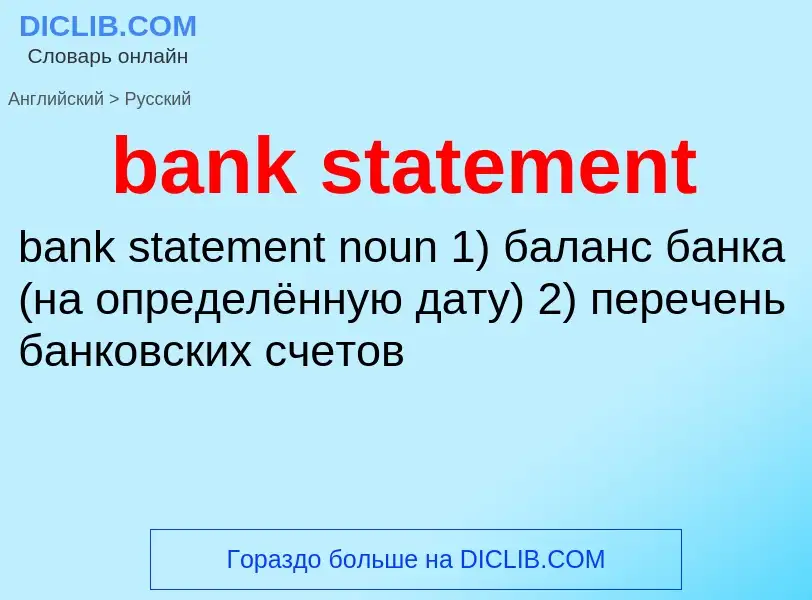ترجمة وتحليل الكلمات عن طريق الذكاء الاصطناعي ChatGPT
في هذه الصفحة يمكنك الحصول على تحليل مفصل لكلمة أو عبارة باستخدام أفضل تقنيات الذكاء الاصطناعي المتوفرة اليوم:
- كيف يتم استخدام الكلمة في اللغة
- تردد الكلمة
- ما إذا كانت الكلمة تستخدم في كثير من الأحيان في اللغة المنطوقة أو المكتوبة
- خيارات الترجمة إلى الروسية أو الإسبانية، على التوالي
- أمثلة على استخدام الكلمة (عدة عبارات مع الترجمة)
- أصل الكلمة
bank statement - ترجمة إلى إنجليزي
['bæŋk'steitmənt]
общая лексика
баланс банка (на определённую дату)
перечень банковских счетов
банковское дело
выписка с банковского счета [со счета, по счету, о состоянии счета] (информация о платежах и поступлениях, сальдо и др., предоставляемая банком клиенту)
бухгалтерский учет
отчет о доходах [о прибылях и убытках]
финансовая отчетность (финансовый документ, содержащий информацию о доходах банка и состоянии его баланса, заполняемый один раз в квартал главным контролером)
американизм
банковский отчет (касается депозитов, подпадающих под резервные требования; заполняется еженедельно совместно с федеральным резервным банком)
синоним
Смотрите также
существительное
общая лексика
баланс банка (на определенную дату)
перечень банковских счетов
تعريف
ويكيبيديا

A bank statement is an official summary of financial transactions occurring within a given period for each bank account held by a person or business with a financial institution. Such statements are prepared by the financial institution, are numbered and indicate the period covered by the statement, and may contain other relevant information for the account type, such as how much is payable by a certain date. The start date of the statement period is usually the day after the end of the previous statement period.
Once produced and delivered to the customer, details on the statement are not normally alterable; any error found would normally be corrected on a future statement, usually with some correspondence explaining the reason for the adjustment.
Bank statements are commonly used by the customer to monitor cash flow, check for possible fraudulent transactions, and perform bank reconciliations. Historically they have been printed on one or more pieces of paper, and either mailed directly to the account holder or kept at the financial institution's local branch for pick-up. In recent years there has been a shift towards paperless electronic statements, and many financial institutions now also offer direct downloads of financial information into the account holders' accounting software to streamline the reconciliation process. Bank statements are important documents and are usually required to be retained for audit and tax purposes for a period set by relevant tax authorities.
To enable account holders to track account activity on an ongoing basis, many financial institutions offer a non-official transaction history before the official bank statement is produced. Such activity may be viewed on or printed from the financial institution's website, a smartphone application, available via telephone banking, or printed by some ATMs.
Transaction histories or account balances may also be shared with other financial institutions, when the account holder gives permission, through open banking to provide services such as account aggregation. An aggregation service only lets the software view an account balance, not actual transactions.


